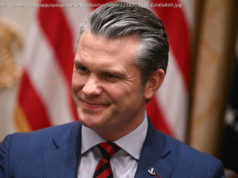From «fire and fury» to summits and appeasement.
P resident Donald Trump’s handling of North Korea has been among the two or three bitterest foreign policy disappointments of the administration’s first two years. The president began with sympathy for the regime’s victims and bellicose rhetoric—“fire and fury”—aimed at its leader. It was a high-risk approach, at points irresponsible in its execution, but it was a refreshing departure from decades of self-deluding conciliation. After just two years, however, Trump finds himself in the opposite position: lauding Kim Jong-un in speeches, boasting of a supposedly “historic” agreement with the regime, and extolling “peace” even as the North Koreans surreptitiously flout every vague promise they made to the United States.
The change began with the president’s decision to meet with Kim himself. After the June summit in Singapore, Kim declared his “firm” and “unwavering” commitment to “denuclearization.” The event began months of optimistic rhetoric and compliments from Trump to the North Korean leader. Hours after the summit, Trump said: “He trusts me and I trust him.” The next day, in a tweet: “There is no longer a Nuclear Threat from North Korea.” And on September 29: “I was really tough and so was he, and we went back and forth. And then we fell in love, okay? No, really, he wrote me beautiful letters, and they’re great letters. We fell in love.”
The document generated by the Singapore summit contained no mutually agreed upon definition of “denuclearization.” But for anybody who knows the first thing about the previous three decades of North Korean diplomacy, it was perfectly clear: For the North Koreans, “denuclearization” means—to the extent it means anything—the disarmament of South Korea and the peninsula’s reunification under the Kim family.
A new study published this week confirms the regime’s ceaseless pursuit of weapons. The report by the Beyond Parallel program at the Center for Strategic and International Studies (CSIS) makes clear that, while North Korea has paused its missile testing, it has not dismantled its nuclear program. Researchers identified at least 13 undeclared missile bases in North Korea that the country has continued work on. The sites are “permanent facilities that contain a unit’s headquarters, barracks, housing, support, maintenance, and storage facilities.” They profiled one base in particular, just 84 miles north of Seoul. NBC News also confirmed with U. S. officials that Pyongyang has kept working on its ballistic missile program.
Kim may be keeping a promise to dismantle a missile site known as Sohae—the regime appears to have started and stopped that work in the months since the summit. But, as the CSIS report notes, “North Korea’s decommissioning of the Sohae satellite launch facility, while gaining much media attention, obscures the military threat to U. S. forces and South Korea from this and other undeclared ballistic missile bases.” The decommissioning of Sohae, in other words, is very likely a ruse.
The U. S. doesn’t look like much of a winner in negotiations with Pyongyang. Kim committed to a vague version of denuclearization in June, a commitment he has made and broken before, but his regime has failed to produce even a basic accounting of the components of his missile and nuclear programs, a prerequisite for any real verification program. The U. S. promised concrete “security guarantees” to the North—including a suspension of joint military exercises with South Korea. “We’ll be saving a tremendous amount of money,” Trump said then of the pause in joint security exercises. “Plus,” he said, echoing the DPRK’s complaint, “I think it’s very provocative.” The administration then suspended a planned August exercise. In October, the U. S. suspended another upcoming military exercise.
Despite the lack of assurances during the June summit, and the resulting back-and-forth diplomacy that has yet to bring about the promised outcome, the administration always had a fallback: the maximum pressure campaign. All along, administration officials reassured anyone willing to listen that the pre-summit sanctions—the sanctions that brought the North to the negotiating table in the first place—remained. Those sanctions were, and still are, far stronger than anything the Obama administration ventured. But the maximum pressure campaign that accompanied them is gone, replaced the president’s amorous rhetoric towards Kim.
This, too, has costs. Under President Obama, Republicans in Congress highlighted the threat from North Korea and demanded a serious approach to mitigating it. But many of these same Republicans seem to have lost their voice since Trump launched his maximum love campaign, unwilling to challenge even his most fanciful claims. North Korea remains a first-order threat but Trump’s boasting, and the eagerness of his party to tout his supposed accomplishments, has contributed to a false sense of security—the misimpression that because there’s active diplomacy underway, we’re somehow safer.
And now the sanctions are unraveling. It was always in China’s interest to keep the Kim regime alive, since the alternative might be a united and U. S.-allied Korea on China’s border; and so the Chinese are finding ways around the sanctions. So is Russia.
The Trump administration’s North Korea policy is failing. The regime has survived the worst of the sanctions, Kim is expanding rather than reducing his nuclear program, he is strengthened and emboldened by direct talks with the U. S. president, his regime’s vicious character is unchanged, and the North’s concessions have been symbolic rather than substantive—returned hostages, repatriation of remains, a pause in some provocations. Five months after the summit, Trump has nothing to show for his policy of appeasement—except for a few very nice love letters.






